July 19, 2018
Edited by David Sanders
Specimen Days
1374—Francesco Petrarca, [Petracco], Italian mountaineer/poet, dies at 69.
1627—Dirck R "Didericus" Camphuysen, poet/printer/vicar, dies at about 41.
1742—William Somervile, English poet (b. 1675). dies.
1819—Gottfried Keller, German-Swiss poet and novelist, born in Zurich (d. 1890).
1863—Dwijendralal Ray, Bengali poet, playwright and lyricist (Dwijendrageeti), born in Krishnanagar, British India (d. 1913), is born.
1893—Vladimir Mayakovsky, Russian poet (Ode to Revolution), born in Baghdati, Soviet Georgia [OS=7/7].
1924—Sybren Polet, [Sijbe Minnema], Dutch writer/poet (Mannekino), is born.
1939—Rose Hartwick Thorpe, American poet (b. 1850), dies.
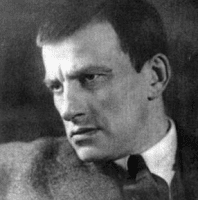
It's already two.
No doubt, you've gone to sleep.
In the night
The Milky Way
with silver filigrees.
I don't hurry,
and there is no point in me
waking and disturbing you
with express telegrams.
—from “Past One O’Clock" by Vladimir Vladimirovich Mayakovsky
“I don’t hurry, / and there is no point in me / waking and disturbing you” – Vladimir Mayakovsky
World Poetry
Liu Xia, Widow of Chinese Dissident Poet, is Freed from House Arrest and Leaves China

After eight years of de facto house arrest, the widow of a Nobel Peace Prize laureate who died last year in Chinese custody boarded her flight to freedom. Liu Xia, a poet, was relentlessly surveilled and effectively detained after the death of her husband, writer and activist Liu Xiaobo, on July 13 of last year. But on Tuesday, she was on her way to Germany.
Liu Xia, widow of Chinese dissident poet, has been freed from house arrest and left China.
Recent Reviews
“Our Abundance along with Theirs”
by David Wojahn
In 1965, shortly after the publication of Robert Lowell’s fifth collection of verse, For the Union Dead, the British critic Irvin Ehrenpreis confidently proclaimed that the poetry of the second half of the twentieth century would be christened the “Age of Lowell.” You have to enjoy quite a reputation if you’re going to have an age named after you: it makes you sound like a geological era as much as a literary figure. But Ehrenpreis was echoing the critical consensus of his day, at least that of the dominant literary circles.
At the Living Heart
Translating Aimé Césaire.
by David B. Hobbs
Aimé Césaire was one of the foremost French poets of the 20th century. He was also one of the foremost leftists on his home island of Martinique and in the French National Assembly. Upon his death in 2008, he was honored with a state funeral attended by then-President Nicolas Sarkozy—ironic, considering Césaire’s refusal to meet with him in 2005, after the passage of a bill compelling French history teachers to emphasize the “positive aspects” of French colonialism.
Li-Young Lee | The Undressing
by Ian Pople
In a recent interview, Li-young Lee commented, ‘I think poetry is the mind of God. All the great poems that I love seem to me to all have that little ingredient. You feel like you’re in the presence of the mind of God.’ Such utterances tend to scare people on this side of the Atlantic; people might agree with Lee’s comments but they would be unlikely to say them.
In a recent interview, Li-young Lee commented, “I think poetry is the mind of God.”
Broadsides
Geoffrey Hill, Prodigal
by Garrick Davis
Among poets writing in English during the last forty years, Geoffrey Hill was sometimes named the greatest one alive, but he was always named the most difficult one to read. He had come to live and teach in America in the 1980s, along with a brilliant group which included Paul Muldoon at Princeton (since 1987), Seamus Heaney at Harvard (1985–2006), and Derek Walcott at Boston University (1981–2007). These were famous poets who had been drawn from the United Kingdom and its old territories to the riches of the American universities, yet they were never American poets. They lived in a kind of half-exile in which they were weighted down with laurels and prizes regularly given by literary committees and societies while being mostly ignored or neglected by their students—as Walcott admitted to me in conversation one day.
My Friend Bob
by Daniel Karlin
“I have never taken the view the world of politics and the world of poetry are so far apart. I think politicians and poets share at least one thing, and that is their greatness depends upon the courage with which they face the challenges of life”: John F. Kennedy paid this tribute to Robert Frost when he died, aged eighty-eight, on January 20, 1963. “The challenges of life” has the hollow boom of a campaign speech. But Kennedy had been the first president to invite a poet to read at his inauguration, exactly two years earlier, and in “Dedication”, the poem Frost composed for the occasion, he, too, reflected on the closeness of poetry to political power
Like, Elizabeth Bishop
by Simon Armitage
I’ll begin with a few quotes, all taken from Geography III. Here’s the first:
Iberia in shape resembles
a stretched-out hide, its breadth
running north to south,
the neck pointing east.
Among poets writing in English during the last forty years, Geoffrey Hill was always named the most difficult one to read.
Drafts & Fragments
Stolen WB Yeats Letters Identified at Princeton University
by Dalya Alberge
A collection of unpublished letters written by WB Yeats that was stolen in the 1970s and returned “anonymously” has been identified at Princeton University. John Kelly, who has spent decades tracking down thousands of Yeats’s letters, discovered the collection as he was concluding research for the latest volume of his work on the Irish poet and dramatist.
Unpublished letters written by WB Yeats that wwere stolen in the 1970s and returned “anonymously” has been identified at Princeton.
Poetry In the News
Pulitzer Prize-winning Poet Will Write New Work for Cincinnati Opera's Centennial
Composer Gregory Spears and U.S. poet laureate Tracy K. Smith have been commissioned by the Cincinnati Opera to write “Castor and Patience,” a story of black cousins in the American South who disagree about the future of land they inherited. The company said Tuesday that the work will premiere at the Corbett Theater at the School for the Creative and Performing Arts in July 2020. The 2020 season will be the opera's centennial.
Archaeologists Find What Could be the Oldest Written Record of Homer's 'Odyssey'
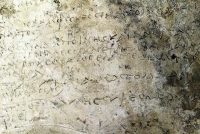
Archaeologists have discovered what they believe is the oldest known inscription of Homer’s epic poem “Odyssey.” The poem was engraved on a clay plaque found in the ancient Greek city of Olympia, a sanctuary on the Peloponnese peninsula and the original site of the Olympic Games, Reuters reports. Researchers have dated the plaque to the Roman times, likely before before the 3rd century AD, the Greek culture ministry said on Tuesday.
Archaeologists have discovered what they believe is the oldest known inscription of Homer’s epic poem “Odyssey.”
New Books
New Poets of Native Nations edited by Heid E. Erdrich
[Paperback] Graywolf Press, 304 pp., $18.00
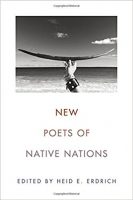
New Poets of Native Nations gathers poets of diverse ages, styles, languages, and tribal affiliations to present the extraordinary range and power of new Native poetry. Heid E. Erdrich has selected twenty-one poets whose first books were published after the year 2000 to highlight the exciting works coming up after Joy Harjo and Sherman Alexie. Collected here are poems of great breadth―long narratives, political outcries, experimental works, and traditional lyrics―and the result is an essential anthology of some of the best poets writing now.
The Heart's Granary: Poetry and Prose from Fifty Years of Enitharmon Press edited by Lawrence Sail
[Hardcover] Enitharmon Press, 400 pp., $37.46
The Heart’s Granary marks the 50th anniversary of Enitharmon Press. Compiled by Lawrence Sail, it is a personal selection from all Enitharmon’s publications. It also conveys the Press’s striking range and coherence – international in reach, while true to its Blakean vision. Including prose as well as poems, with more than 120 contributors, and with full color illustrations by some of the many well-known artists who represent another facet of Enitharmon’s achievements, the anthology creates new contexts for writers, translators and artists, from Nobel Prize winners to emerging talents. The Heart’s Granary is memorable not only on its own account, but as a touchstone of the journeys undertaken by writers in a world that has changed radically since Enitharmon’s beginnings in 1967. Befittingly, this momentous publication marks the end of a much-cherished poetry list.
I Would Lie to You if I Could: Interviews with Ten American Poets edited by Chard deNiord
[Paperback] University of Pittsburgh Press, 360 pp., $19.95
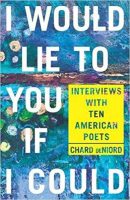
I Would Lie To You If I Could contains interviews with nine eminent contemporary American poets (Natasha Trethewey, Jane Hirshfield, Martín Espada, Stephen Kuusisto, Stephen Sandy, Ed Ochester, Carolyn Forche, Peter Everwine, and Galway Kinnell) and James Wright’s widow Anne. It presents conversations with a vital cross section of poets representing a variety of ages, ethnicities, and social backgrounds.
How It Is: Selected Poems by Neil Shepard
[Paperback] Salmon Poetry, 178 pp., $25.00
Although Neil Shepard ha long been associated with the stony foundations of Vermont, both by his luminous invocations of the natural world and his Frost-worthy, densely woven lyricism, he has emerged over the course of his writing life as an intrepid, wise and wry observer of the larger world. His poems are expansive, meticulous in their emotional cartography, and always historically resonant while still discovering those troubled reckonings of the self in motion, in travel. What emerges is nothing less than an ethical aesthetic, a narrative architecture that constellates around a strong moral center even as, at times, the poet's confidence in that center quietly dissolves in the deep bath of experience. Yet this impeccably crafted collection remains the voice of a mature, hard-won, and individual poetic resolve.–David St. John.
A Memory of the Future: Poems by Elizabeth Spires
[Hardcover] W. W. Norton & Company, 96 pp., $26.95
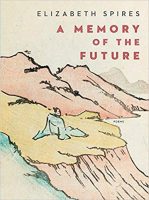
In A Memory of the Future, critically acclaimed poet Elizabeth Spires reflects on selfhood and the search for a core identity. Inspired by the tradition of poetic interest in Zen, Spires explores the noisy space of the mind, interrogating the necessary divide between the social persona that navigates the world and the artist’s secret self. With vivid, careful attention to the minute details of everyday moments, A Memory of the Futureobserves, questions, and meditates on the ordinary, attempting to make sense of the boundaries of existence.
New Poets of Native Nations gathers poets of diverse styles, languages, and tribal affiliations to present the power of new Native poetry.
Correspondences
Ange Mlinko & Christopher Richards
Authors and Editors in Conversation
Poet Ange Mlinko has been praised by The New Yorker for writing “intoxicating, cerebral poems [that] display a unique sense of humor and mystery.” She recently caught up with FSG’s Christopher Richards to discuss storytelling, advice for young poets, and just why aging for a poet is like tuberculosis for Keats. Her new collection, Marvelous Things Overheard, is now available.
Gieve Patel's Collected Poems Offer a Rare Journey into the Writer’s Mind and Imagination
by Manik Sharma
William Wordsworth wrote in Resolution and Independence that young poets always ‘begin in gladness’. In the introduction to Gieve Patel’s Collected Poems (Paperwall, 2018) poet Arundhati Subramaniam puts Patel’s absence from the poetry scene for almost three decades down to two possibilities: a ‘sense of inner necessity being muted’ or Patel’s vigorous interaction with the visual arts compensating for that necessity in one way or another. It is easy to ascribe Patel’s missing act to the middling decency of the latter than Wordsworth’s suggestion of a later ‘madness’. That and the fact that Patel, from among the Bombay Poets, is also its least worn part, an amulet still unstudied to the extent that it enables detachment. It hasn’t helped over the years that the Bombay Poets have only recurred in celebratory capacity, with little attention given to critiquing their writings. Gieve Patel’s Collected Poems though offers that opportunity.
Ange Mlinko has been praised for writing “intoxicating, cerebral poems [that] display a unique sense of humor and mystery.”
Envoi: Editor’s Notes
Lessons from the Past: Vladimir Mayakovsky
"Art must not be concentrated in dead shrines called museums. It must be spread everywhere – on the streets, in the trams, factories, workshops, and in the workers' homes." —Vladimir Vladimirovich Mayakovsky
“Art must not be concentrated in dead shrines called museums. It must be spread everywhere.” —Vladimir Mayakovsky